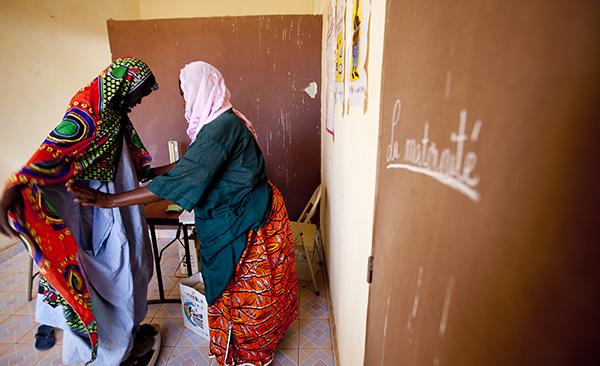Where We Work
See our interactive map


Photo by Trevor Snapp for IntraHealth International
Obstetric fistula is an important example on Human Rights Day because it is an underrepresented and often unheard of condition that affects a population that is also underrepresented and unheard: impoverished women.
Over 2 million women around the world are living with obstetric fistula. So why haven’t you heard of it?
A fistula is a hole that forms between the vagina and the bladder and/or rectum during prolonged or protracted labor. It results in incontinence of urine and/or feces, pain, and more for the mother and, most often, stillbirth.
Up to 100,000 women develop fistulas each year.
Fistula is most prevalent among women in sub-Saharan Africa and Asia. These women are also likely to lack basic education, be subjected to early and forced marriage, lack adequate food and water, and some also face harmful cultural practices such as female genital mutilation.
The numbers, likely underestimated, suggest that up to 100,000 women develop fistulas each year. But less than 20,000 fistula repair surgeries are performed annually.
The good news is that if we answer the United Nations' call for human rights together on Human Rights Day 2016, fistula could be prevented, treated, and even eliminated for all women.
While surgeries and care by programs such as IntraHealth International’s End Shame Restore Dignity are providing treatment for women already afflicted by fistula, it is also critical to recognize and address the ways in which human rights violations of women are part of the context in which women develop the condition.
The right to health is the first human right that comes to mind when addressing a medical condition. But the fulfilment of all basic human rights is essential to the prevention and treatment of fistula. If the conditions are present for a woman to develop a fistula, then it most likely means her rights to food, water, education, and protection from violence and discrimination are being violated too. Adolescent girls are more likely to develop fistula, which can also indicate human rights violation through early or forced marriage. Reproductive rights and access to contraception are also critical to prevention and must be addressed to ensure that women can make reproductive decisions free from coercion or discrimination.
The fulfilment of all basic human rights is essential to the prevention and treatment of fistula.
When a woman develops a fistula and is unable to access the necessary obstetric and surgical care, the violation of her right to health ripples out into all facets of her life. Women often experience psychological and emotional trauma in addition to the physical implications of fistula and they are often denied the right to work as a result of social ostracism. They are often abandoned by their husbands and families, leaving them without economic or social support. Women living with untreated fistula face immense obstacles to the realization of their basic human rights, which is why raising awareness about fistula on Human Rights Day is so important.
IntraHealth’s End Shame Restore Dignity campaign provides surgical and post-surgical treatment for women living with fistula in Mali. And IntraHealth’s broader mission to improve the performance of health workers and strengthen the systems in which they work is crucial to ensuring that fistula can be prevented, identified, and treated in Mali and all over the world.
Now that YOU know about fistula, help us raise awareness.
Health workers are able to identify signs of fistula and help women seek appropriate health and social services. And IntraHealth has partnered with the G4 Alliance to ensure that access to safe surgery for all, including emergency obstetric services, is a part of the right to health. Health workers also provide physical, emotional, and psychological care to women as they rejoin their communities after fistula repair surgery. Well-trained and accessible health workers have the potential to enable health systems to not only address fistula as a medical condition—but also to address it in the context of women’s human rights.
If you are interested in learning more about IntraHealth International’s End Shame: Restore Dignity project, check out www.endshamerestoredignity.org. Now that YOU know about fistula, help us raise awareness by sharing the campaign with your networks, and, if you can, contribute yourself. Even a small contribution can have a big impact on the lives of women living with fistula.
For more information on IntraHealth International’s work to make sure everyone everywhere has the health care they need, visit our new website at www.intrahealth.org.
Get the latest updates from the blog and eNews




